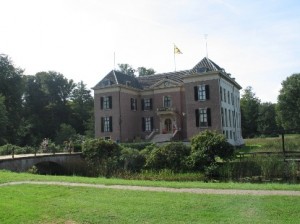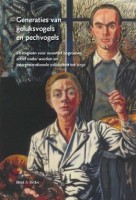Chapter 14 – Synopsis
The ‘Foreword’ was written by Prof. Dr. Paul Schnabel, director of the Netherlands Institute for Social Research. In December 2010 his Institute published a report entitled Wisseling van de Wacht: Generaties in Nederland (Changing of the Guard: Generations in the Netherlands). In all probability, the Netherlands has this report to thank for being the best researched country as regards the pattern of generations.
Chapter 1 introduces generations. A thought experiment prefaces this introduction. Taking a hypothetical man, how would his life have developed if he had been born ten years earlier or ten years later? This thought experiment is also applied to a hypothetical woman. The thought experiment was devised by Goethe who included it in his autobiography published in 1830. If Goethe had been born ten years earlier, he would have been formed by Classicism; however, his actual date of birth occurred in a lee between Classicism and the Romantic Movement. During that lee he was able to prepare himself of his own accord for his part in the Romantic Movement, eventually becoming the leading light of the ‘Sturm und Drang’ movement.
In his autobiography, Goethe reflects on how major social events can affect not only the opportunities people are given during their lifetime but also the threats they face. What major social events influenced people’s opportunities and threats in the 20th century and the beginning of the 21st? How did these major events amalgamate people into generations?
Bonus Chapter added to the Book on Generations – Bonus Chapter 15: Frequently Asked Questions
15.1 General questions
15.2 Questions regarding theories
15.3 Questions regarding methods
15.4 Further questions
This set of frequently asked questions and related answers will be updated regularly. A Dutch translation will be supplemented shortly.
15.1 General questions
Could essay contests release the potentials of European Years’?
Frequently ‘European Years’ have been organized already by the European Commission, supported by NGO’s. Until today, these annual campaigns did trigger little attention only in the member states and the Union as a whole. Each European Year a number of projects is organized in support of the event, but these projects also do not result in much attention. Consequently, the European Years are in need of an additional campaign that presents an overall image and charisma. The additional campaign will also have to present an integrated overview of the projects financed in the European Year.
In the European Year 2012 the theme is: ‘active ageing and solidarity between generations up to 2020’. The first component requires attention to the specific characteristics of the generations of seniors involved in the period 2012 to 2020. The second component implies co-operation between members of generations, but also social justice between generations. This component is closely related to the concept of sustainability. This is because sustainability is defined as ‘fair play’ between generations. The third component is related to the policy document ‘Europe 2020’, issued by the European Commission. This policy document advocates strategies for smart, sustainable and inclusive growth up to the year 2020. In support of EY2012 the EC has made available two documents: ‘2012: Everyone has a role to play’ and ‘Manifesto for an Age-Friendly European Union by 2020’.
The theme for EY2012 requires substantial background information regarding the knowledge and know-how on generations in society provided by the social sciences. Regarding this background information this book has become available.
Bonus hoofdstuk bij Generatie boek: Generatiewandelingen in Doorn en andere onderwijs- en beleidsprojecten
Levensgeschiedenissen
Toelichting
Heel wat leerlingen in het VWO en studenten in het HBO houden zich in hun onderwijs met generaties bezig. Zij schrijven er werkstukken over en komen steeds vaker in aanvulling hierop ook met videoreportages. Vooral vakken zoals maatschappijleer, geschiedenis, economie en management lenen zich goed voor scripties en afstudeerwerkstukken over generaties.
Hierbij werken de leerlingen veelal met levensgeschiedenissen van leden van generaties. Daarbij gaat het om een aanpak, die als de ‘life histories approach’ bekend staat.
De ‘life histories approach’wordt veelvuldig in de geschiedwetenschappen en de sociologie toegepast. Meerdere hoofdstukken in dit boek bevatten voorbeelden van deze toepassing.
Omdat te verwachten is dat het boek Generaties van geluksvogels en pechvogels veel leerlingen tot het toepassen van generaties in hun onderwijs zal inspireren, komen nu enkele voorbeelden aan de orde. Als eerste voorbeeld zijn interviews te noemen met senioren, die tot de Vooroorlogse en Stille generatie behoren. Hoe zijn hun jeugdjaren verlopen en welke effecten heeft hun formatieve periode op hun verdere levensloop gehad? Welke indrukken zijn hen bijgebleven van de ‘Culturele Revolutie’ van het eind van de jaren zestig en het begin van de jaren zeventig? Hoe hebben zij van de economisch gunstige jaren negentig geprofiteerd en hoe hebben zij zich voorbereid op de jaren na ingang van hun pensioen?
Een volgend voorbeeld zijn interviews met vrouwen over hun ervaringen met vrouwendiscriminatie. Leden van de Vooroorlogse en Stille generatie hebben nog sterke vormen van discriminatie op de arbeidsmarkt meegemaakt. Denk aan vrouwen in overheidsdienst, die bij het in het huwelijk treden automatisch ontslag kregen. Tot de ingrijpende effecten van de ‘Culturele Revolutie’ behoort een sterke vermindering van de vrouwendiscriminatie. Geheel verdwenen is deze vorm van discriminatie echter zelfs in het jaar 2012 nog niet.
Generatiewandelingen in Doorn en andere onderwijs- en beleidsprojecten
Levensgeschiedenissen
Toelichting
Heel wat leerlingen in het VWO en studenten in het HBO houden zich in hun onderwijs met generaties bezig. Zij schrijven er werkstukken over en komen steeds vaker in aanvulling hierop ook met videoreportages. Vooral vakken zoals maatschappijleer, geschiedenis, economie en management lenen zich goed voor scripties en afstudeerwerkstukken over generaties.
Hierbij werken de leerlingen veelal met levensgeschiedenissen van leden van generaties. Daarbij gaat het om een aanpak, die als de ‘life histories approach’ bekend staat.
De ‘life histories approach’ wordt veelvuldig in de geschiedwetenschappen en de sociologie toegepast. Meerdere hoofdstukken in dit boek bevatten voorbeelden van deze toepassing.
Omdat te verwachten is dat het boek Generaties van geluksvogels en pechvogels veel leerlingen tot het toepassen van generaties in hun onderwijs zal inspireren, komen nu enkele voorbeelden aan de orde. Als eerste voorbeeld zijn interviews te noemen met senioren, die tot de Vooroorlogse en Stille generatie behoren. Hoe zijn hun jeugdjaren verlopen en welke effecten heeft hun formatieve periode op hun verdere levensloop gehad? Welke indrukken zijn hen bijgebleven van de ‘Culturele Revolutie’ van het eind van de jaren zestig en het begin van de jaren zeventig? Hoe hebben zij van de economisch gunstige jaren negentig geprofiteerd en hoe hebben zij zich voorbereid op de jaren na ingang van hun pensioen?
Generational walks in Doorn and other educational projects
Life histories
Explanatory notes
Many pre-university pupils and students attending higher vocational education study generations. They write papers on this topic, often supplementing them nowadays with video reports. Social studies, history, economics and management, particularly, lend themselves to theses and graduation papers on generations.
Most students write papers on the life histories of members of generations. This practice is known as a ‘life history approach’, which is habitually used in historical sciences and sociology. Several chapters in Generations of Lucky Devils and Unlucky Dogs contain examples of this approach.
Because this book, Generations of Lucky Devils and Unlucky Dogs, will likely inspire many pupils to learn about generations during their studies some examples are provided here, the first being interviews with seniors of the Pre-War Generation and the Silent Generation. What was their childhood like and how did their formative years affect the rest of their lives? What impressions have they retained of the ‘Cultural Revolution’ of the late 1960s and early 1970s? How did they benefit from the economically favourable 1990s and how did they prepare themselves for their retirement years?
A second example is interviews with women concerning their experience with discrimination against women. Members of the Pre-War and Silent Generations suffered serious discrimination on the employment market. Take, for instance, women in public service who automatically lost their job upon getting married. One of the radical effects of the ‘Cultural Revolution’ is the strongly reduced discrimination against women, although it is still not entirely eradicated even in the year 2011.
About the author
Prof. dr. Henk A. Becker was born in Greifswald, Germany, in 1933. In 1946 he emigrated to the Netherlands, where he obtained his sociology degree (cum laude) at Leiden University in 1958. From 1956 to 1964 he held a staff position within a government ministry. From 1964 to 1968 he was the head of the research department of the Sociological Institute at the Netherlands School of Economics, which today is Erasmus University Rotterdam. He took his doctoral degree there in 1968 with a thesis on management careers, which concerned an early version of a normative career analysis and of a computerized career simulation. The University of Utrecht appointed him professor of sociology as well as of methodology of social research in 1968.





